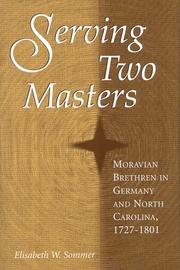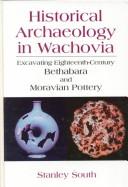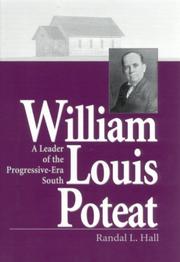| Listing 1 - 7 of 7 |
Sort by
|
Book
Year: 1999 Publisher: [Washington, D.C.] : [U.S. G.P.O.],
Abstract | Keywords | Export | Availability | Bookmark
 Loading...
Loading...Choose an application
- Reference Manager
- EndNote
- RefWorks (Direct export to RefWorks)
Book
ISBN: 1469672057 9781469672052 1469670895 9781469670898 Year: 2022 Publisher: Raleigh, North Carolina
Abstract | Keywords | Export | Availability | Bookmark
 Loading...
Loading...Choose an application
- Reference Manager
- EndNote
- RefWorks (Direct export to RefWorks)
"In the early twentieth century, Winston-Salem was hailed as the "town of a hundred millionaires." Booming tobacco and textile manufacturing industries converged to make Winston-Salem the largest and richest city in all of North Carolina, and major architects flocked to the area to design for its newly wealthy clientele. Ambitious commercial buildings and gracious suburban estates abounded, hosting generations of families that shaped the economic future of the country. Great Houses and Their Stories explores Winston-Salem's finest residential architecture from that era--its spacious mansions, palatial gardens, and even working farms--and delves deeply into the stories of the people who lived and worked in those historic buildings. This is a book for the preservationists, history buffs, and architecture lovers of the world, and for the Winston-Salem residents who have always wondered about the abundance of green-roofed mansions still surviving in their city, even as similar pockets of early 20th century architecture throughout the country have been lost to time."--Cover.
Architecture, Domestic. --- 1900-1999 --- Winston-Salem (N.C.) --- Buildings, structures, etc.
Book
Year: 2016 Publisher: [Washington, D.C.] : [U.S. Government Publishing Office],
Abstract | Keywords | Export | Availability | Bookmark
 Loading...
Loading...Choose an application
- Reference Manager
- EndNote
- RefWorks (Direct export to RefWorks)

ISBN: 0813157234 9780813157238 1322598290 9781322598291 0813121396 9780813121390 Year: 2015 Publisher: Lexington The University Press of Kentucky
Abstract | Keywords | Export | Availability | Bookmark
 Loading...
Loading...Choose an application
- Reference Manager
- EndNote
- RefWorks (Direct export to RefWorks)
The eighteenth century was a time of significant change in the perception of marriage and family relations, the emphasis of reason over revelation, and the spread of political consciousness. The Unity of the Brethren, known in America as Moravians, experienced the resulting tensions firsthand as they organized their protective religious settlements in Germany. A group of the Brethren who later settled in Salem, North Carolina, experienced the stresses of cultural and generational conflict when its younger members came to think of themselves as Americans.The Moravians who first immigrated to Am
Moravians --- Brethren, United --- Hernhutters --- Herrnhuter --- Society of United Brethren --- Unitas Fratrum --- United Brethren --- Hussites --- History --- Salem (Winston-Salem, N.C.) --- Old Salem (Winston-Salem, N.C.) --- Salem (Forsyth County, N.C.) --- Church history
Book
ISBN: 0813040590 9780813040592 9780813037486 Year: 2011 Publisher: Gainesville University Press of Florida
Abstract | Keywords | Export | Availability | Bookmark
 Loading...
Loading...Choose an application
- Reference Manager
- EndNote
- RefWorks (Direct export to RefWorks)
Leland Ferguson's work reconstructing this ""secret history"" through years of archaeological fieldwork was part of a historical preservation program that helped convince the Moravian Church in North America to formally apologize in 2006 for its participation in slavery and clear a way for racial reconciliation.
Slavery --- Excavations (Archaeology) --- African Americans --- Moravians --- History. --- Religious aspects --- Moravian Church. --- Moravian Church --- North Carolina --- Salem (Winston-Salem, N.C.) --- Race relations. --- Antiquities. --- Church history. --- Moravian Church (Winston-Salem, N.C.)

ISBN: 1280206977 9786610206971 0306471434 0306456583 Year: 2002 Publisher: New York : Kluwer Academic Publisher,
Abstract | Keywords | Export | Availability | Bookmark
 Loading...
Loading...Choose an application
- Reference Manager
- EndNote
- RefWorks (Direct export to RefWorks)
Originally distributed with a different title as a very limited edition of twelve in 1975, Historical Archaeology in Wachovia presents a unique record of the 1753 Moravian town of Bethabara, near Winston-Salem, North Carolina. Stanley South, who led the site's excavation in 1966, fully describes such discoveries as fortifications from the French and Indian War and twenty ruins of various shops and dwellings in the town. He also illustrates methods of ruin excavation and stabilization, including the replacement of palisade posts in the original fort ditch as part of the site's development as Historic Bethabara Park. Some of the most interesting of South's finds concern the confluence of two traditions of pottery and stoneware production. One of these is represented by forty pottery wheel-thrown types and forms made by the master German potter Gottfried Aust between 1755 and 1771, excavated from the ruin of his shop and kiln waster dump. Additional work at both Bethabara and Salem recovered the waster dumps of Aust's journeyman potter Rudolph Christ, who had also studied with the Staffordshire potter William Ellis. Christ's wares, which demonstrate both German and English influences, are discussed in detail. Extensively documented and heavily illustrated with over 320 photographs, drawings, and maps, this volume - a classic example of the process of historical archaeology as demonstrated by one of its foremost practitioners in America - is a valuable resource for avocational archaeologists, particularly those living in the Southeast, as well as historical archaeologists, historians, ceramicists, ceramics collectors, students of colonial culture, and museologists.
Moravians --- Potters --- Pottery, Colonial --- Archaeology and history --- Excavations (Archaeology) --- Antiquities. --- History --- Winston-Salem (N.C.) --- Church history. --- Archaeology. --- Anthropology. --- History. --- History, general. --- Annals --- Auxiliary sciences of history --- Human beings --- Archeology --- Anthropology --- Antiquities --- Brethren, United --- Hernhutters --- Herrnhuter --- Society of United Brethren --- Unitas Fratrum --- United Brethren --- Hussites

ISBN: 0813157684 9780813157689 0813121558 9780813121550 0813187664 9780813187662 Year: 2000 Publisher: Lexington
Abstract | Keywords | Export | Availability | Bookmark
 Loading...
Loading...Choose an application
- Reference Manager
- EndNote
- RefWorks (Direct export to RefWorks)
William Louis Poteat (1856-1938), the son of a conservative Baptist slaveholder, became one of the most outspoken southern liberals during his lifetime. He was a rarity in the South for openly teaching evolution beginning in the 1880's, and during his tenure as president of Wake Forest College (1905-1927) his advocacy of social Christianity stood in stark contrast to the zeal for practical training that swept through the New South's state universities.Exceptionally frank in his support of evolution, Poteat believed it represented God at work in nature. Despite repeated attacks in the early 1920
Evolution --- Baptists --- College teachers --- Biology teachers --- Social reformers --- Baptist Church --- Anabaptists --- Academicians --- Academics (Persons) --- College instructors --- College lecturers --- College professors --- College science teachers --- Lectors (Higher education) --- Lecturers, College --- Lecturers, University --- Professors --- Universities and colleges --- University academics --- University instructors --- University lecturers --- University professors --- University teachers --- Teachers --- Science teachers --- Reformers --- Philosophy --- Creation --- Emergence (Philosophy) --- Teleology --- Religious aspects --- Baptists. --- Study and teaching --- History. --- Faculty --- Poteat, William Louis, --- Wake Forest College --- Wake Forest Institute --- Wake Forest University --- Wake Forest College, Winston-Salem, N.C.
| Listing 1 - 7 of 7 |
Sort by
|

 Search
Search Feedback
Feedback About UniCat
About UniCat  Help
Help News
News